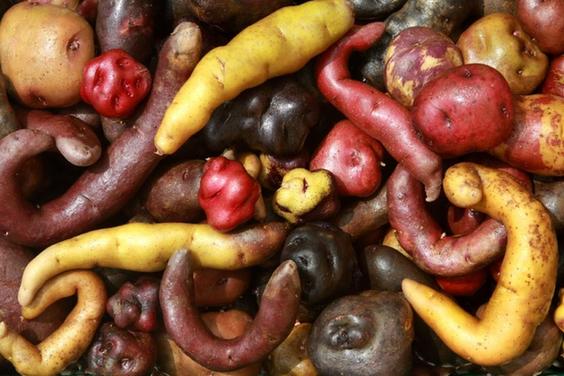当前位置: Language Tips> 双语新闻
NASA to simulate growing potatoes on Mars in Peru

Do Peru's potatoes have the right stuff?
秘鲁的土豆能经受住考验吗?
That's the question scientists will be asking in Lima next month, when a selection of tubers will begin undergoing tests to determine whether they're fit to grow on Mars.
这是下个月科学家将要在秘鲁首都利马问的一个问题,届时,经过精心挑选的土豆块茎将接受测试,以确定它们能否在火星上种植。
NASA, the US space agency, is conducting the pioneering experiment together with Lima's International Potato Center (CIP).
美国航天局(NASA)将与利马国际马铃薯中心(CIP)联手,进行这一开创性实验。
They will cultivate a hundred selected varieties already subjected to rigorous evaluation in extreme, Mars-like conditions that could eventually pave the way to building a dome on the Red Planet for farming the vegetable.
他们将对100种精心挑选的、已在类火星极端环境下严格评估的品种进行培育,而这最终将为人们在这颗红色星球上建立蔬菜种植“大棚”铺平道路。
The selection was made from a total of 4,500 varieties registered at CIP, a nonprofit research facility that aims to reduce poverty and achieve food security.
国际马铃薯中心是一个致力于削减贫困、保证粮食安全的非营利研究机构。这些土豆是从在国际马铃薯中心登记注册的4500个品种中挑选出来的。
Of the selected candidates, 40 are native to the Andes Mountains, conditioned to grow in different ecological zones, withstand sudden climate changes and reproduce in rocky, arid terrain.
在获选土豆中,有40种是安第斯山脉土生土长的品种。这些品种可在不同生态地区生长、对气候的突然变化具有耐受性,并可在多岩石的干旱土壤中生长繁育。
The other 60 are genetically modified varieties able to survive with little water and salt. They are also immune to viruses.
另外60种土豆均为转基因品种,能够在缺水和低钠的环境中生存。此外,这些品种还对病毒免疫。
Those that pass the tests must meet a final criterion -- they must be able not only to grow well on Mars but also reproduce in large quantities.
这些品种最终必须达到一个标准:不仅能在火星上茁壮生长,而且还能被大量繁育。
"We're almost 100 percent certain that many of the selected potatoes will past the tests," said Julio Valdivia Silva, a Peruvian NASA astrobiologist who is taking part in the ambitious project.
参与美国航天局此项宏伟计划的秘鲁裔太空生物学家胡里奥·瓦尔迪维亚·席尔瓦说:“精选出来的土豆中,将会有不少品种通过测试,对此我们有百分百的把握。”
The scientists hope the experiment will also help address the earthly scourges of hunger and malnutrition by identifying varieties suited to growing in harsh conditions.
科学家还希望通过该实验找出适合在严酷环境下生长的土豆种类,来帮助解决地球人口饥饿和营养不良的难题。
"We must be prepared for the future," said virologist Jan Kreuze, a scientist at CIP. "To respond to desertification, rising temperature and high salt content in the soil."
“我们必须为未来做准备”,国际马铃薯中心的科学家扬·克鲁兹说。“准备应对沙漠化、气候变暖和高盐分的土壤。”
Vegetable of the future
未来的蔬菜
The soil in La Joya Pampas -- a sector of the Atacama Desert in southern Peru that's considered one of the driest places on earth -- is very similar to that found on the Red Planet.
位于秘鲁南部阿塔卡马沙漠的潘帕斯德拉霍亚地区被认为是地球上最干旱的地方之一,那里的土壤与人们在火星上发现的非常相似。
The scientists plan to transport 200 pounds (100 kilos) of it to a CIP laboratory in Lima that will simulate the complex Martian atmosphere -- which contains mostly carbon dioxide -- and expose it to extreme ultraviolet radiation.
科学家计划将大约200磅(100千克)土壤运送到利马国际马铃薯中心的实验室中。在那里,他们将模拟火星上二氧化碳居多的复杂大气环境,并将土壤暴露在极端紫外线照射中。
"We'll have more concrete results in one or two years, Valdivia said, adding that it will take more than five years to launch an unmanned mission to Mars.
瓦尔迪维亚说:“未来一两年内,我们会得出实验的具体结果。我们还将花至少五年的时间向火星发射无人探测器。”
The potential future space crop is also one of the oldest.
土豆这种未来极有可能占领太空的作物,也是地球上最古老的作物之一。
Records of potato cultivation date back to 2500 BC, when the indigenous Aymara Indians farmed it in modern-day Peru and Bolivia.
种植土豆的记载可以追溯到公元前2500年,那时勤劳的艾马拉族印第安人就在现在的秘鲁和玻利维亚种植土豆了。
If the varieties selected for next month's experiment don't adapt to the desert soil, the researchers will introduce nutrients and subject them to radiation.
下个月,这些选出的土豆品种将参与实验。如果这些土豆不能适应沙漠土壤,那么研究人员将对它们施以养分并将其置于紫外线照射下。
"If that doesn't work," Valdivia said, "we'll administer a new method the CIP is using called aeroponics."
瓦尔迪维亚说:“如果还是不行的话,我们会采用国际马铃薯中心使用的一种名叫‘气栽’的新方法。”
The technique, used for cultivating plants without soil, would expose roots inside a sphere or cube that is sprayed with nutrients and contains a system for removing toxins.
这是一种无土种植技术:将植物的根部置于球体或立方体容器中。容器中原本已喷洒了营养剂,并内置了一套去除毒素的机制。
In future years, NASA plans to build a Mars research center in the Peruvian desert.
未来,美国航天局还计划在秘鲁沙漠中建造一座火星研究中心。
It would create a perfect replica of the Martian landscape and atmosphere for future research into space farming that could serve manned missions to Mars and other planets in the solar system.
该研究中心将逼真还原火星的地貌和大气状况,以供未来太空种植研究之用。太空种植将为探测火星等其他太阳系行星的载人任务提供补给。
英文来源:yahoo.com
译者:心若水
审校&编辑:杜娟
上一篇 : 茶或咖啡:哪个更适合你?
下一篇 : 小女孩因奥巴马将卸任痛哭
关注和订阅


电话:8610-84883645
传真:8610-84883500
Email: languagetips@chinadaily.com.cn